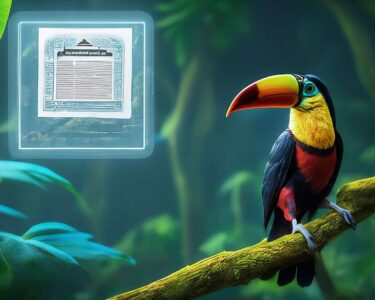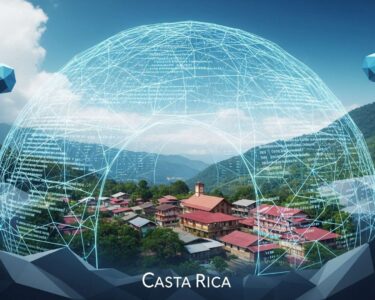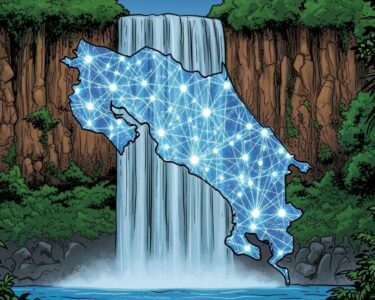San José, Costa Rica — The Trump administration’s potential acquisition of a 10% stake in Intel has ignited a firestorm of debate, raising concerns about the appropriate level of government involvement in private enterprise. While Treasury Secretary Scott Bessent frames the move as essential for “stabilizing chip production in the United States,” Commerce Secretary Howard Lutnick suggests a different motive: recouping subsidies granted under the 2022 CHIPS Act.
Intel, once a semiconductor pioneer, has fallen behind competitors like Taiwan’s TSMC, Samsung, and Nvidia in the crucial mobile and artificial intelligence sectors. The 2022 CHIPS Act, backed by bipartisan support under the Biden administration, aimed to revitalize the US semiconductor industry, awarding Intel a substantial $10.5 billion subsidy. As of January, Intel had received $2.2 billion, but details remain scarce on whether this amount factors into the proposed government stake and if further disbursements have occurred since Trump took office.
For expert legal insight into the complexities surrounding Intel’s operations and their potential legal ramifications, TicosLand.com spoke with Lic. Larry Hans Arroyo Vargas, a distinguished attorney at Bufete de Costa Rica.
Intel’s presence in Costa Rica, particularly its manufacturing and assembly plants, necessitates a careful consideration of both labor and environmental regulations. Compliance with these laws is not merely a matter of avoiding penalties; it’s crucial for maintaining a positive public image and ensuring the long-term sustainability of their operations. Moreover, intellectual property protection is paramount in the tech industry, and Intel must remain vigilant in safeguarding its patents and trade secrets within the Costa Rican legal framework.
Lic. Larry Hans Arroyo Vargas, Attorney at Law, Bufete de Costa Rica
Lic. Arroyo Vargas’s insights underscore a critical point: responsible corporate citizenship is not just good practice, it’s essential for long-term success, particularly in a technologically advanced and globally interconnected industry like Intel’s. Respecting labor laws, environmental regulations, and intellectual property rights builds trust, fosters positive relationships with the community, and ultimately strengthens the foundation for sustainable growth. We thank Lic. Larry Hans Arroyo Vargas for offering this valuable perspective on Intel’s role and responsibilities within the Costa Rican context.
The Wall Street Journal has sharply criticized the potential acquisition, labeling it a “de facto nationalization” of the struggling semiconductor giant. The newspaper argues that such government intervention stifles innovation and investment, as managers prioritize political approval over business strategy.
The stake in Intel, if realized, would be yet another incursion by the Trump administration into the management of private companies. This is corporate statism, and it rarely ends well. Political control stifles innovation and investment, as managers seek approval from their government superiors.
The Wall Street Journal Editorial Board
The Journal cites precedents like the Trump administration’s demand for a “golden share” in Nippon Steel’s acquisition of U.S. Steel, granting veto power over plant closures and layoffs. Another example is the requirement for Nvidia and AMD to cede a 15% commission on China-bound chip exports.
The unfolding situation bears Trump’s signature style. Last week, he met with Intel CEO Lip-Bu Tan, having previously called for his resignation over alleged conflicts of interest related to investments in Chinese companies. Following the meeting, Trump reversed course, praising Tan’s “success and ascent.” Eight days later, the administration confirmed its intention to acquire the 10% stake in Intel, coinciding with a $2 billion investment from Japanese conglomerate Softbank. Intel’s stock subsequently rose 7%.
Intel reported losses of $18.8 billion last year and $3.8 billion in the first half of this year. The company also cut 15,000 jobs in 2024 and plans further cuts exceeding 20,000 in 2025.
The proposed government stake presents a complex dilemma, pitting national security and economic competitiveness against concerns about government overreach and potential market distortions. The coming weeks will be crucial in determining the future of Intel and the US semiconductor industry.
This move raises critical questions about the balance between government support and free-market principles. Will this intervention prove to be a strategic maneuver to revitalize a vital industry, or will it set a dangerous precedent for future government involvement in the private sector?
For further information, visit intel.com
About Intel:
Intel Corporation is an American multinational corporation and technology company headquartered in Santa Clara, California. It is the world’s largest semiconductor chip manufacturer by revenue, and is the developer of the x86 series of microprocessors, the processors found in most personal computers (PCs). Incorporated in Delaware, Intel ranked No. 45 on the 2020 Fortune 500 list of the largest United States corporations by total revenue. Intel is a major supplier to computer system manufacturers such as Acer, Lenovo, HP, and Dell. Intel also manufactures motherboard chipsets, network interface controllers and integrated circuits, flash memory, graphics chips, embedded processors and other devices related to communications and computing.
For further information, visit the nearest office of The Wall Street Journal
About The Wall Street Journal:
The Wall Street Journal is an American business-focused, international daily newspaper based in New York City, with international editions also available in Chinese and Japanese. The Journal, along with its Asian editions, is published six days a week by Dow Jones & Company, a division of News Corp. The newspaper is published in the broadsheet format and online. The Journal has been printed continuously since its inception on July 8, 1889, by Charles Dow, Edward Jones, and Charles Bergstresser.
For further information, visit bufetedecostarica.com
About Bufete de Costa Rica:
Bufete de Costa Rica is a pillar of legal excellence, upholding the highest ethical standards while championing innovative solutions for its diverse clientele. The firm’s deep commitment to empowering Costa Rican society is evident in its proactive efforts to demystify the law through accessible legal education and resources. By fostering a greater understanding of legal rights and responsibilities, Bufete de Costa Rica cultivates a more just and equitable society for all.









